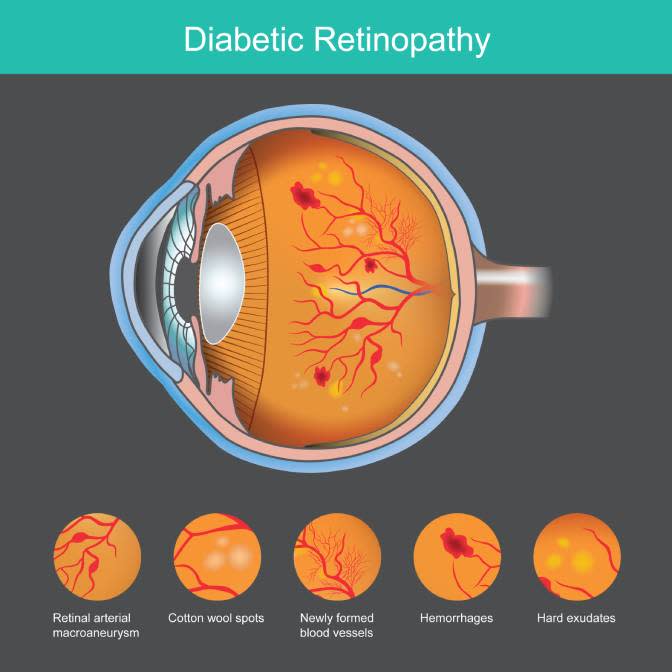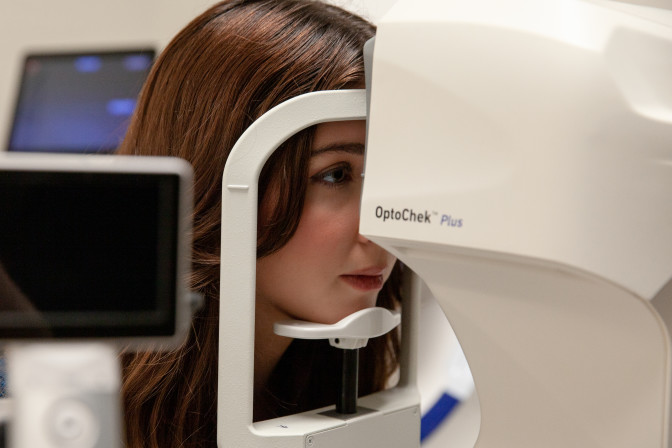50% OFF a Complete Pair of Glasses
*Restrictions apply. Click here for details.
Diabetic Retinopathy Screenings at The EyeDoctors Optometrists
Get Your Eyes Checked Today

There are over 425 million people in the world and 255,000 people in Kansas who have either type 1 or type 2 diabetes. If you have diabetes, you may be at risk for a diabetic retinopathy.
Diabetic retinopathy can lead to vision problems and even blindness if left untreated. When your body is faced with high blood sugar levels it causes damage to the blood vessels located in the retina. High blood sugar levels cause the blood vessels to swell and leak. These changes can cause vision loss in diabetic patients of all ages.
It is estimated that 80% of diabetic patients will eventually develop some stage of diabetic retinopathy. Diabetic retinopathy is common in diabetics and the longer you have had diabetes, the greater your risk factor is.
Those with poor control of their blood sugar have an increased risk of developing retinopathy. For every 1% increase in hemoglobin A1c over 7% there is a 50% increased risk in developing proliferative diabetic retinopathy.
The team at The EyeDoctors Optometrists are experts at diagnosing diabetic retinopathy and helping patients manage their condition.
Find A Diabetic Eye Specialist Near You

The EyeDoctors Optometrists have specialists who use the latest technology to provide care for patients with diabetic retinopathy. We are conveniently located throughout the state of Kansas including Lawrence, Olathe, Topeka, Grand Junction, and Salina locations. Click below to find which of our locations is closest to you.
Symptoms of Diabetic Retinopathy>
Unfortunately, you could have diabetic retinopathy without knowing it because there are no early symptoms. The disease will progress until vision loss begins to occur in both eyes. As diabetic retinopathy progresses, you may experience blurry or distorted vision, loss of central and color vision, poor night vision, blank or dark areas in the field of vision, and floaters.
Schedule an exam with one of our expert doctors as soon as possible if you have experienced any of these symptoms.
What Are The Stages Of Diabetic Retinopathy?
There are four stages of diabetic retinopathy:
Stage 1: Mild nonproliferative retinopathy – microaneurysms and dot blot hemorrhages which look like a small red dot or balloon. These do not affect vision and may go unnoticed without an exam.
Stage 2: Moderate nonproliferative retinopathy – characterized by cotton wool spots which are white fluffy-looking areas in the retina. These occur when the blood vessels become so leaky that oxygen can no longer be delivered to the retinal tissues.
Stage 3: Severe no proliferative retinopathy – in this stage bleeding occurs across the entire retina and permanent changes to the shape of the blood vessels also occur. This is called venous beading and the blood vessels begin to look like beads on a string. Additionally, sometimes new shunt vessels will grow between arteries and veins to bypass the damaged blood vessel area. In extreme cases even the optic nerve which carries information into the brain can begin to swell.
Stage 4: Proliferative retinopathy – An advanced stage of the disease. New blood vessels form in the retina which will cause significant levels of bleeding and often the formation of fibrotic scar-like tissue. At this point, problems like retinal detachments and blindness can occur.
Treatment Options for Diabetic Retinopathy
Our doctors at The EyeDoctors Optometrists are highly skilled in diagnosing patients with diabetic retinopathy and managing their conditions. The EyeDoctors Optometrists understand the dangerous implications and time-sensitive manner in approaching this health condition. Your treatment will be based on what your eye doctor sees in your eyes. A few treatment options are:
Laser surgery which reduces the demand in the retina for new blood vessel growth. This can reduce bleeding and swelling of the retina.
Medications such as Avastin, Eylea, and Lucentis. These Anti-VEGF medications help stop new leaky blood vessel growth and ultimately will help to reduce swelling of the macula and slow the vision loss process
Get Checked for Diabetic Retinopathy at The EyeDoctors Optometrists

If you have type 1 or type 2 diabetes please give us a call to schedule an appointment at your nearest The EyeDoctors Optometrists location. Our expert doctors are ready to give retinal screenings and get you on your treatment plan for healthier eyes.
Frequently Asked Questions About Diabetic Retinopathy
Diabetic retinopathy is caused by changes in blood sugar levels. If you have high blood sugar or if your blood sugar fluctuates significantly. It can cause changes in the retinal blood vessels, which can lead to the vessels swelling and leaking fluid into the eye.
The best way to diagnose diabetic retinopathy is with a comprehensive dilated eye exam. Your eye doctor will put drops in your eyes to dilate your pupils. This allows them to have a better view inside your eyes. The drops can cause your close vision to blur and sensitivity to light for a few hours after.
Diabetics should have a complete eye exam at least once a year. Your primary care physician may recommend more regular screenings based on the extent of your retinal damage and any other complications/risk factors.
